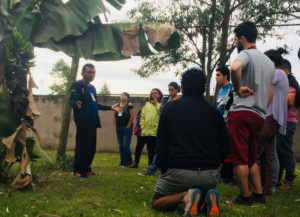HOW TO REMAIN CONTENT WHEN YOU FEEL TRAPPED? JOSEPH’S LEADERSHIP LESSON (GENESIS 39-45)
As long as you are proud you cannot know God. A proud man is always looking down on things and people: and, of course, as long as you are looking down, you cannot see something that is above you.
C.S. Lewis (Mere Christianity)
“The Lord was with Joseph…” – Genesis 39:2
MOSES OFFERS A REMEDY FOR LEADER FATIGUE | NUMBERS 11
In the closing hours of our four-day retreat with three youth pastors in Asia, the Lord led us to a devotion in the book of Numbers…
Moses was at a point of extreme fatigue in his ministry (like many youth leaders I know). Frustrated and burdened by all of the people looking to him for leadership, he realizes he is in over his head and beyond his abilities. So he cries out to God for help. At wits-end and discouraged from the pressure, God responds to Moses. But he doesn’t answer his prayer the way he was expecting.
Moses just wanted some pots of meat to quell the people’s hunger. God would later provide the meat, but not without offering Moses some more important provision. Instead of meat, God provides Moses with more leaders to shepherd Israel. Seventy to be exact. Seventy spirit-filled leaders would help solve this leadership crisis:
DISCIPLESHIP FROM ROOT TO FRUIT | JOHN 15:1-17
A believer may pass through much affliction, and yet secure very little blessing from it all. Abiding in Christ is the secret of securing all that the Father meant the [discipline] to bring us.– Andrew Murray
Top 7 Spiritual Gifts Tests, Assessments, and Inventories
A Comparison and Overview of the Most Popular Assesments
What were you made to do? What are your spiritual gifts? These are questions that we all wonder about at some point. The Scriptures talk about spiritual gifts pretty clearly (I Corinthians 12; I Peter 4:9-11; Romans 12:1-8; Ephesians 4:7-13), but sometimes it can still feel like there is a disconnect between the spiritual gifts in the ancient Scriptures and how they relate to our daily lives. Spiritual gifts inventories are helpful in identifying the gifts you have by examining your personality, how you operate on a regular basis, and talents that you lean toward. Identifying your gifts helps you live out of your identity and produce spiritual fruit. If you lead others in any capacity, it is beneficial to know what gifts your people have also. Then, you can intentionally put people in positions or circumstances that empowers them to succeed and be fruitful, which brings health to the entire group.
Which Inventory Should I Use?
Doing a google search for “spiritual gifts test” or “spiritual gifts inventory” will pull up numerous different sources that each vary in ways. We looked through these results to find the best inventories and compared them to each other. Here are the best ones we found and what we learned about them. May this be helpful in choosing the assessment you will use personally or for your group.
Advice on Taking Advice & Admonishment: Open Wide Your Heart
Have you ever received a piece of advice from someone that made you feel like shutting down? At times we receive correction that is handled gracefully which is easier to receive. And in other occasions someone in authority may give us a nudge that isn’t offered with kid gloves. Interestingly, the Bible guides us to receive all of it, whether its served up wth a nice bow or not. Wisdom is gained by being a teachable person. If you notice that your heart closes or responds coldly to people, teachers, pastors, your boss, when they offer you correction or exhortation, then you may want to take a step back and figure out why.
HOW YOU RECEIVE ADVICE INDICATES IF YOU ARE ASCENDING OR DESCENDING IN MATURITY
The Apostle Paul ran into this situation and has some very valuable advice for all of us. Apparently, he had been working day and night to lovingly teach and shepherd the early Christians in Corinth. And although he was committed to them enough to say the hard things, they lacked the maturity to receive his leadership and guidance. In fact rather than having an open heart to Paul, they were responding coldly to him.
Spiritual Adventure Keeps the Leader’s Soul Healthy
Adventure is any pursuit you step into where you are not sure of the outcome. –Muhia Karianjahi (Kenyan leader)
In the event that the cabin loses air pressure, please put your oxygen mask on first and then after you have secured your own mask, help your child to put on their mask. – Flight attendant
SURRENDER YOUR SOUL FIRST TO JESUS SO YOU CAN CARE FOR OTHERS LONG TERM
Leaders especially are always thinking about how they can help other people. This is good, but not if you get out of balance. It seems like the right thing to care for the soul of someone else in need even at the expense of our own soul, but this is not the pattern we see in Scripture. You need to first tend to your own soul’s thirst for God. Then you can attend to the needs of others with much more grace.
IS YOUR SOUL CRAVING A DEEPER ADVENTURE WITH GOD?
Let’s consider some of these passages that reflect on our soul’s deepest desire for adventure with God:
5 WAYS TO STRENGTHEN YOUR RELATIONSHIP WITH YOUR TEEN
Good relationships are vital to health. Family relationships, especially, are fundamental in equipping children to live a happy and successful life. Achieving strong family relationships take care, work, and effort. It is no surprise to anyone that the teen years bring challenges that can threaten good, positive relationships between parents and their children. There is hope, however, of combating these challenges and maintaining or developing strong, healthy relationships with your teens.
ParentFurther is an online resource that has tools to help families strengthen relationships through shared activities. They have identified 5 research-backed relationship strategies to help us learn and grow with each other.
-
EXPRESS CARE
We all need to know that we are cared about. Teens especially need to feel that their parents care about them. Care is shown when we listen, when we are warm to each other, when we invest in each other, when show interest, and when we are dependable. Research shows that when children and youth have warm caring relationships, they do better in school, have less risky-behavior, work harder, and have a hopeful sense of purpose.
-
CHALLENGE GROWTH
Challenging occurs is many forms in the parent-child relationship. Part of a parent’s role is to challenge their child to grow, learn, and improve. Inspire your teen to see future possibilities for themselves. Give expectations that are clear and communicate that you want your child to live up to their potential. Stretch your child by encouraging them to push beyond their abilities Provide limitations that hold your child accountable to rules and expectations
-
PROVIDE SUPPORT
Support also come is many ways, but there can never be too much of it! Supporting your teen in practical and noticeable ways occurs through encouragement, guidance, modeling, and advocating. As relationships are two-way, so is support. It is good for parents to have support from other adults as a model for your teens.
-
SHARE POWER
“Sharing power” refers to the actions used to influence, learn from, and work with each other. How do you share power then? In our relationships it looks like sharing respect, negotiating (giving each other a voice in making decisions that affect them), responding to each other, and collaborating to accomplishing goals and solve problems.
-
EXPAND POSSIBILITIES
Trying new things, meeting new people, going to new places, and thinking about new ideas are all ways in which you can expand possibilities for yourself and for your teen. Help your teen explore by exposing them to new people, places, and things. Connect them to others that can help them grow. Navigate through problems that could prevent them from expanding their possibilities with them.
Visit parentfurther.com for more information about these strategies and to read about the research backing them. You will also find quizzes and discussion questions to ask your teens.
I highly recommend you visit their website and take their free inventory to see growth areas in your own parenting skills with teenagers.
A Conflict Resolution Tool You’ll Want to Memorize
If you fit into any of these categories below, this post will give you a tool you can use all of the time. Do you want to…
- Build Deeper Relationships with Teenagers and Help them with Conflict Resolution with their Friends?
- Lead Small Groups Effectively
- Train Volunteer Youth Leaders How to Deal with Conflict
- Be a Christ-Centered Parent to Teenagers and College Students
This tool is for you…
PERSONAL STORY
Have you ever had what you thought was a really great idea that in the end went horribly wrong?
One winter a few years ago we got a storm that dropped about 3 feet of snow in our neighborhood. And since we didn’t have a snow plowing service, I thought it would be a “great idea” to take my Toyota Landcruiser out, put on the chains and just drive up and down the street a bunch of times to make some tracks for our neighbors to be about to get out of the neighborhood. I got my kids in the car, we started driving like a tank through huge drifts of snow, having lots of fun, and it seemed to be working.
Well, after the snow tracks got packed down… all of a sudden, we hear this huge “screech, ka bloom…” and the front end of my Landcruiser lost its steering. I thought… oh, the snow must be too deep lets just rev the engine more… well we drove right up on the sidewalk and I couldn’t steer the front end… we got out and discovered that unbeknownst to me, my chains had started to digging through the snow and was grabbing onto the asphalt below the chain had broken, wrapped around the steering arm, and snapped it… so the front wheels were turned completely sideways… (as the tow truck lifted my Landcruiser up to drag it way I thought, “Hmmm… I sure did think that was a great idea… but it was a really bad one…”
Joshua 22 is a profound story that shows how one group of Israelites thought they had a Great idea, but actually it turned out to be a really bad idea, and hurt other folks badly… maybe that sounds familiar in your life?
CONFLICT + RESOLUTION = INTIMACY
Conflict resolution is not just a skill for counselors. If you want good relationships in a sinful world, you will have to learn how to resolve conflict.
Early on in my ministry experience I learned a formula that continues to ring true in my life: CONFLICT + RESOLUTION = INTIMACY. When you step toward the person you are in conflict with, and humbly seek resolution, the natural result almost always is that we become closer to that person. There is no silver bullet on how to do this, but one technique that I learned from studying Joshua 22 has given me a tool to resolve conflict.
CONFLICT RESOLUTION IS LIKE “CHESS”
To get the most of the technique I am about to share you really have to read Joshua 22. Maybe read it now or at least read it after you finish reading this post. Like “chess,” to win the game you have to be aware of the whole situation, you have to think ahead and anticipate obstacles. Similarly, what we learn from Joshua 22 is that the context behind this event is an epic conflict that almost began a civil war among Israel. Joshua 22 gives us a formula for conflict resolution that lawyers and professional peace-makers still use today.
After studying this passage and how this conflict was resolved I thought of an Acronym, CHESS to help remember the main steps for conflict resolution. I like acronyms because in the heat of the moment it is easy to remember them and then you can start walking through the situation with more objectivity and less emotion.
Here is the easy memory tool called, “CHESS” that you can use to diffuse and resolve conflicts successfully:
C: CHARACTERS
First identify all of the characters or people involved in the conflict? Joshua makes a point to list out all of the tribes and some of the background of jealousy and animosity between these tribes. Sometimes we jump over thinking about the bigger context of our relationships because we are so distracted by our hurt. It is important to understand each person involved in the conflict because there may be a few people you need to have a conversation with, not just one. Ask: Who are all of the people involved in this conflict?
H: HISTORICAL RELATIONSHIPS
What is the history of the relationships in this conflict? Step back and think about if there is a history of this type of conflict with this person. Maybe there is a pattern that needs to be pointed out. By thinking of the history of your relationship with this person will do two things:
- First it cause you to “take the log out of your own eye before you try to take the speck out of the other person’s eye.”
Why do you look at the speck of sawdust in your brother’s eye and pay no attention to the plank in your own eye? How can you say to your brother, ‘Let me take the speck out of your eye,’ when all the time there is a plank in your own eye? You hypocrite, first take the plank out of your own eye, and then you will see clearly to remove the speck from your brother’s eye. (Matthew 7:3-5)
- Second, it will give you more perspective in how to approach this person with grace and patience because you will not come across as an irrational person with a selfish agenda to be right.
E: EVENTS
What is the flow of the Events that led up to the conflict? Are there any other mini-conflicts or offenses that led to this current blow up? If you take the time to become aware of the events leading up to this conflict, other people will respect you when you initiate a conversation. They can tell that you care because you have spent time thinking about the whole situation, not just your own hurt.
S: SIDES
There are always two side’s of the story. If you want to be a peacemaker and relationship builder you need to realize there is always two sides to a story. Get the other person’s story and actively listen to them. Repeat back to them, “So what I’m hearing you say is… Is that right?” Then they have a chance to correct you if you heard them wrong, or to affirm that you heard them correctly.
S: STATE THE PROBLEM CLEARLY
Joshua clearly states the problem and offers resources to resolve the problem. He identifies the relevant issues, that made the problem blow up. Then Joshua explained what resources the people had to deal with the problem to resolve the conflict (they had the Law of Moses, and the authority of the priests to look into the matter). [1]
If you’d like to listen to my full 40 minute talk explaining Joshua 22 you can click the link below. Thanks!
Click here to LISTEN TO MY TALK ON CONFLICT RESOLUTION FROM JOSHUA 22
Please share this post with a friend who might benefit from it!
[1] The case-writing principles developed in this post were inspired by the following case-study tool for missiology: 7 Steps to Making a Case Study into a Learning Tool
Joy can be Experienced When Circumstances Stink – Matthew 5: 1-12
The Sermon on the Mount for Teenagers
Two things that every teenager can identify with are a lack of hope and a deep sense of loneliness. Joy is the remedy, but how do you find it?
 LACK OF HOPE
LACK OF HOPE
When classes get hard, school seems totally pointless, friends betray you, you get cut from a team or fail a quiz… all of this can make a teenager feel hopeless. Hope is when a person has reason to believe something good is going to happen to them. Teenagers, because of the roller coaster of emotions and disloyalty among peer relationships, often do not feel like anything good is going to happen to them today, or tomorrow. Because emotions are heightened in adolescence, it is not uncommon for them to either hate or love school, depending on the day or month. This is a normal pattern, but it is not a helpful one. Those of us who really love teenagers can do something to help our teenage friends experience hope even if their circumstances stink.
LONELINESS
Because everyone wants to feel included, teenagers tend to run in small packs. Unfortunately to preserve their sense of belonging they often cut down or make fun of other kids who are not in their group. The devastation of this pattern is insecurity for just about everyone. When a kid cuts someone down or does not show mercy toward someone who messed up, the result is deeper loneliness because everyone intrinsically knows that they are no better than anyone else. Eventually this “pack mentality” catches up with everyone. Each of us will mess up and get made fun of or ridiculed, its just a matter of time.
So how do you break out of this vicious cycle, and maybe help another teenager get free from this joyless trap of loneliness and fleeting hope?









